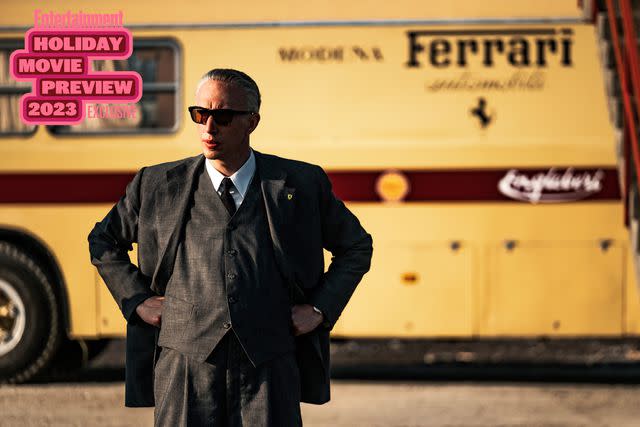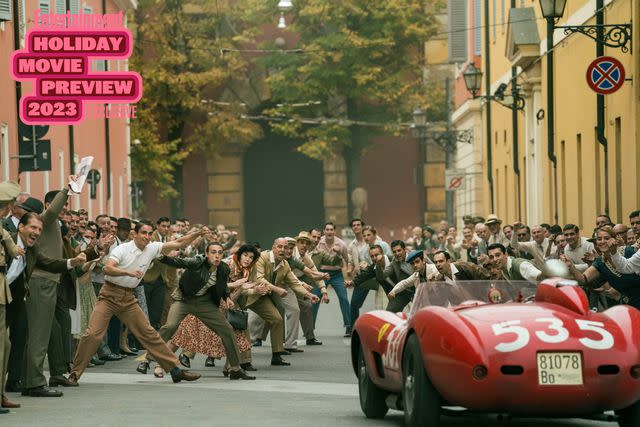Michael Mann promises 'the Gucci movie' had nothing to do with Adam Driver's “Ferrari” casting
The filmmaker says he met Driver 'well before' seeing 'House of Gucci.'
When Ferrari finally crosses the finish line and hits U.S. theaters this Christmas after years of development, it will mark director Michael Mann’s first film since 2015's Chris Hemsworth-led Blackhat. But the acclaimed filmmaker behind Heat (1995) and Miami Vice (2006) hasn’t exactly been idle during this time. As he is quick to remind EW at the top of our interview, Mann directed the pilot of the Max series Tokyo Vice and co-wrote the bestselling novel Heat 2, which he’s already working on turning into a screenplay. And, of course, there was the COVID-19 pandemic.
Still, eight years is a long time to wait for the many fans of Mann’s cinematic style. Indeed, Ferrari contains some of Mann’s storytelling trademarks (cool cars, professional men struggling to balance their passion for work with their equally demanding personal lives) but eschews others (there are no loud guns or violent robberies here).
To hold you over until Ferrari’s release this Dec. 25, EW asked the director everything we could think of about his new film, from casting Adam Driver as Enzo Ferrari to building racecars from scratch. Check it out below.

Neon
ENTERTAINMENT WEEKLY: How does it feel to have gotten Ferrari across the finish line, so to speak? How does the finished film compare to your original vision for it?
MICHAEL MANN: Well, I anticipated making Ferrari for a number of years, and what always held my attention was the story. Troy Kenny Martin wrote this screenplay, and the story takes one behind the surface of the iconic image of Enzo Ferrari — that stately figure with the sunglasses who seems impermeable — into the intensely passionate private life of what was happening right there in those particular three months of 1957. That is what always kept me in: the drama of what was really going on with him and his wife, Laura [Penelope Cruz]. He had a second family that Laura didn't know about, and his company’s on the verge of bankruptcy because all he really cares about is racing and the racing team. That’s because he really has the mentality of a racecar driver. It's a very romantic and kind of addictive perception. He calls it “our terrible joy, our dangerous passion,” and that’s exactly what it is.
When it comes to that iconic figure of Enzo Ferrari, how did Adam Driver catch your eye for the part? He’s played a famous Italian before in House of Gucci. Did that put him on your radar?
No, the Gucci movie had nothing to do with it. I met with him well before I saw House of Gucci. There’s a real-world, factual intelligence to Adam. He’s somebody who, in his own personal history, has lived life. I sense the strength and the artistic integrity coupled with a pretty fierce artistic ambition as an actor. It's not political or charming, which I like a lot. It's just there and strong. It felt to me that he would understand Enzo Ferrari. I mean, I'm trying to put into words what was a very powerful, intuitive realization I had when we were having drinks one night at the Chateau Marmont together and just talking about nothing. That’s when I thought he could be Enzo Ferrari. I make casting decisions based on that perception of what's going on inside. The physical manifestation, the physical look, that's craft work, that’s secondary. So, it's not like I had to find somebody who looked like Enzo Ferrari. Nobody looks like Enzo Ferrari.
Throughout Adam’s career, he’s been compared to that ‘70s generation of New Hollywood actors like Robert De Niro and Al Pacino. You’ve worked with those guys as well, so what do you make of that comparison? Do you see anything in common?
I think it’s apt to compare him to De Niro and Pacino, but I don't think it's generational. I think it’s about approach and commitment to the moment, having no hesitations or qualms about really reaching for the high E on the violin or walking on a tightrope without a net underneath. Al does that. So, it’s artistic ambition, which is different than career ambition. [It's] the kind of artistic ambition that drives one to try to achieve something and overcomes hesitation and fear. So, there's no fear. There is anxiety, that you're not going to pull it off, but you still go for it. Adam has that quality, and that's very similar to a whole number of actors that I like to work with, whether it's Daniel [Day-Lewis] or Bob [De Niro] or Ansel Elgort for that matter. It’s also Mark Ruffalo. It's an attitude about your work. And by the way, it's not "work" as a four-letter word. It's work as a fantastic adventure, and why would you want to do it any other way?
There have been reports that maybe you’ll work with Adam again in Heat 2.
Yeah, we’re in discussion. That’s all I can say about it.

Neon
How did you film the different racing sequences to both give us the wide view of these cars driving through those Italian landscapes, but also in some scenes put us in those cars with the drivers?
When I'm a director, I'm kind of acting, except it’s not a role, it’s the whole movie. So, I ask myself as an actor would ask himself, “What's my action? What do I want?” But that means, "How do I want to impact the audience experience?" I wanted them to experience, as much as I'm capable, of being in the car and what that means. I’ve done enough amateur racing over the years, so then I expand on tha: "What if you could do this all the time?" It’s that singular focus not on what you're doing, but on what's next. Meanwhile, what you're feeling is agitation, and it's constantly moving. So, a director could approach racing with long lenses and have these beautiful, idyllic shots of distant cars moving through a couple of chicanes on a mountain road, but I didn't want that because it pushed the audience back into being observers. I didn't want them observing, I wanted them experiencing. So, that determined everything. We designed and engineered some very complicated and very effective camera systems, which plugged into the tubular chassis beneath the sheet metal of the cars so that we could actually move cameras all over moving cars going 120 miles an hour. We didn't use trickery or CGI or something to generate the speed. Everybody in the cars were going that fast. We built all the cars from scratch.
A lot of your work has a deeply felt sense of time and place. When I was talking to Ken Watanabe about Tokyo Vice last year, he said he was really impressed by how you found the deeper levels of Tokyo, not just the surface level. So, how would you say the experience of postwar Italy in the ‘50s, coming out of World War II, hangs over this movie and informs what the characters are going through?
It did in many ways. First of all, everything was shot where it happened. That is Ferrari's house. The historic opera really is next door. The barbershop is, in fact, right around the corner, and the decor is unchanged since 1957. The barber who's shaving Adam is the son of the barber who shaved Enzo. But just as important, if not more important, are the attitudes, psychology, and emotion. It’s period-accurate sociology. What are the authority structures that are dominating life? Even if you're rejecting the authority of the Catholic Church, the fact that there is this strong, rigid ideology that's present in the environment makes behavior be a certain way.
The other authority structure in Modena at the time was the Italian Communist Party, which was dominant after the end of World War II. In 1957, the economic recovery, “La Dolce Vita,” hasn't occurred yet. So, if you went grocery shopping, you had a bag full of lira because inflation was so rampant. These were very hard times, and I did try to get a sense of that. They got the first order for the first Ferrari car in 1947 with a 10-percent deposit. They didn't have enough capital to buy the components to build the car, so Laura pawned a wedding gift that Enzo gave her. He didn't ask her to, she did it on her own. That first car, six races later, wins the Rome Grand Prix. So, they’re coming from a state of nothing, and they built this from scratch. That understanding is not there in the text, but it is embedded in Penelope's attitudes about Laura and Enzo's attitudes about Laura. When Enzo says, “we have history,” this is what he's referring to.
Want more movie news? Sign up for Entertainment Weekly's free newsletter to get the latest trailers, celebrity interviews, film reviews, and more.
Related content:
Adam Driver responds 'f--- you' when questioner calls Ferrari crash scene 'cheesy'
Adam Driver hits the gas in first trailer for Michael Mann's Ferrari
Read the original article on Entertainment Weekly.


